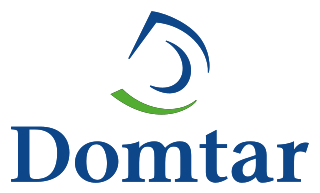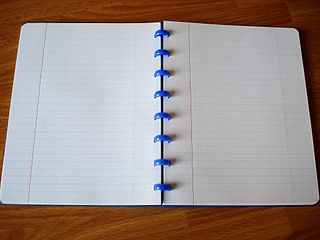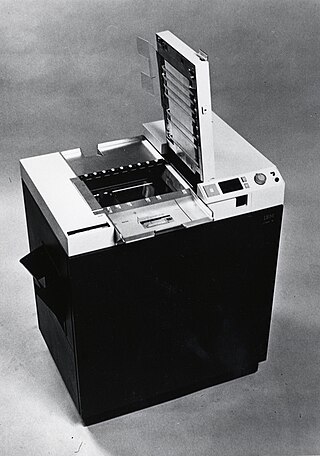Related Research Articles

Toilet paper is a tissue paper product primarily used to clean the anus and surrounding anal region of feces, and to clean the external genitalia and perineal area of urine or other bodily fluids. It also acts as a layer of protection for the hands during these processes. It is usually supplied as a long strip of perforated paper wrapped around a paperboard core for storage in a dispenser near a toilet. The bundle, or roll of toilet paper, is known as a toilet roll, or loo roll or bog roll in Britain.

The chemical industry comprises the companies that develop and produce industrial, specialty and other chemicals. Central to the modern world economy, it converts raw materials into industrial and consumer products. The plastics industry contains some overlap, as some chemical companies produce plastics as well as chemicals.

Kimberly-Clark Corporation is an American multinational personal care corporation that produces mostly paper-based consumer products. The company manufactures sanitary paper products and surgical & medical instruments. Kimberly-Clark brand name products include Kleenex facial tissue, Kotex feminine hygiene products, Cottonelle, Scott and Andrex toilet paper, Wypall utility wipes, KimWipes scientific cleaning wipes and Huggies disposable diapers and baby wipes.

Liquid Paper is an American brand of the Newell Brands company marketed internationally that sells correction fluid, correction pens, and correction tape. Mainly used to correct typewriting in the past, correction products now mostly cover handwriting mistakes.
Symyx Technologies, Inc. was a company that specialized in informatics and automation products. Symyx provided software solutions for scientific research, including Enterprise Laboratory Notebooks and products for combinatorial chemistry. The software part of the business became part of Accelrys, Inc. in 2010 and then in 2014 this company merged with Dassault Systèmes. Symyx also offered laboratory robotics systems for performing automated chemical research, which in 2010 was spun out as Freeslate, Inc.

The pulp and paper industry comprises companies that use wood as raw material and produce pulp, paper, paperboard, and other cellulose-based products.

Domtar Corporation is an American company that manufactures and markets wood fiber-based paper and pulp product. The company operates pulp and paper mills in Windsor, Quebec, Dryden, Ontario, Kamloops, British Columbia, Ashdown, Arkansas, Hawesville, Kentucky, Plymouth, North Carolina, Marlboro County, South Carolina, and Kingsport, Tennessee. While the company operated independently for several decades with listing on the Toronto and New York stock exchanges, the company was acquired by Paper Excellence in November 2021 and has since operated as a subsidiary.

Ruled paper is writing paper printed with lines as a guide for handwriting. The lines often are printed with fine width and in light colour and such paper is sometimes called feint-ruled paper. Additional vertical lines may provide margins, act as tab stops or create a grid for plotting data; for example, graph paper is divided into squares by horizontal and vertical lines.

Seed companies produce and sell seeds for flowers, fruits and vegetables to commercial growers and amateur gardeners. The production of seed is a multibillion-dollar business, which uses growing facilities and growing locations worldwide. While most of the seed is produced by large specialist growers, large amounts are also produced by small growers that produce only one to a few crop types. The larger companies supply seed both to commercial resellers and wholesalers. The resellers and wholesalers sell to vegetable and fruit growers, and to companies who package seed into packets and sell them on to the amateur gardener.
A loose leaf is a piece of paper of any kind that is not bound in place, or available on a continuous roll, and may be punched so as to be organized in a ring binder. Loose leaf paper may be sold as free sheets, or made up into notepads, where perforations or glue allow them to be removed easily. "Leaf" in many languages refers to a sheet or page of paper, as in Folio, as in feuille de papier (French), hoja de papel (Spanish), foglio di carta (Italian), and ルーズリーフ.

Union Camp Corporation was an American pulp and paper company and a private owner of timberland in the United States. In 1999 it was acquired by International Paper.

The Telegram & Gazette is the only daily newspaper of Worcester, Massachusetts. The paper, headquartered at 100 Front Street and known locally as the Telegram or the T & G, offers coverage of all of Worcester County, as well as surrounding areas of the western suburbs of Boston, Western Massachusetts, and several towns in Windham County in northeastern Connecticut.
RockTenn was an American paper and packaging manufacturer based in Norcross, Georgia. In 2015, it merged with MeadWestvaco to form the WestRock company.

Showa Denko K. K., founded in 1939 by the merger of Nihon Electrical Industries and Showa Fertilizers, both established by a Japanese entrepreneur Nobuteru Mori, is a Japanese chemical company producing chemical products and industrial materials.

Earth Fare is an American health and wellness supermarket with 20 locations in 8 states throughout the Southeast United States. It sells natural and organic food that the company claimed to have the highest product standards in the United States, and was one of the largest natural and organic food retailers in the country. After closing all stores in February 2020, three locations reopened in June 2020 and a total of 20 locations operate as of March 2021.

Disc-binding is a type of notebook binding that uses discs to hold the sheets of paper. Each disc has a raised edge. Notebook sheets have perforations along the binding edge that match the profile and spacing of the binding discs.

Paper is a thin sheet material produced by mechanically or chemically processing cellulose fibres derived from wood, rags, grasses, or other vegetable sources in water, draining the water through a fine mesh leaving the fibre evenly distributed on the surface, followed by pressing and drying. Although paper was originally made in single sheets by hand, almost all is now made on large machines—some making reels 10 metres wide, running at 2,000 metres per minute and up to 600,000 tonnes a year. It is a versatile material with many uses, including printing, painting, graphics, signage, design, packaging, decorating, writing, and cleaning. It may also be used as filter paper, wallpaper, book endpaper, conservation paper, laminated worktops, toilet tissue, currency, and security paper, or in a number of industrial and construction processes.

The Allied Paper Corporation was created in 1921 by a merger of three paper mills in Kalamazoo and Otsego, both in South-West Michigan, USA. The company grew steadily over the next 40 years but when local forests had been logged off and when profits could no longer support further investments and updates it became uncompetitive. Allied mills were closed or sold during the 1970s and 1980s, and the corporation passed into history during 1988. Hundreds of millions of dollars have since been spent in South West Michigan cleaning up the last Allied Paper mill site and the PCB pollution caused by this company.

Bellamy's Organic is an Australian organic infant formula and baby food producer, and was a wholly owned subsidiary of Bellamy's Australia before being acquired by China Mengniu Dairy.

IBM Office Products Division (OPD) manufactured and sold copier equipment and supplies from 1970 till IBM withdrew from the copier market in 1988. IBM's decision to compete in this market resulted in the first commercial use of an organic photoconductor now widely used in most photocopiers. It is often held up as an example of a corporate u-turn, where a company rejects a technology and then adopts it. It showed that despite the size of IBM's sales and engineering organisations, this did not guarantee success in every market it chose to compete in. The development effort that resulted in the IBM Copier helped in the development of IBMs first laser printer, the IBM 3800.`
References
- ↑ Chen, James. "Organic Growth". Investopedia.